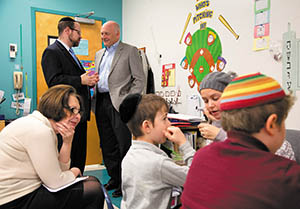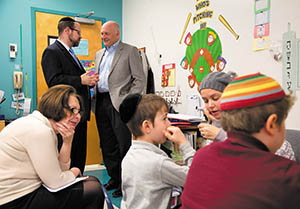

For more than 15 years, Sinai Schools’ vocational students have volunteered at Holy Name Medical Center for workplace training. They have worked alongside medical professionals of many types and explored numerous vocational roles in a welcoming environment. In the last year however, the relationship between the two organizations has flourished to the point of great impact to both the special needs and local medical communities, as well as the greater Teaneck community at large.
The partnership was expanded when Holy Name’s CEO, Michael Maron, attended the 2015 Sinai Schools Annual Dinner, as the community partnership honoree. He was struck, as many are, at Sinai’s work towards promoting inclusion and in helping the special needs community prosper and achieve, and at how comfortable Sinai families are within the inclusive Teaneck community. “I became more aware of the incredible work being done by Sinai. I felt that Holy Name should do more for these students and their families,” Maron told the Jewish Link.
“Holy Name and Sinai are united by a common thread that values human dignity,” Maron said.
“This was a launching point to a much broader relationship,” said Sam Fishman, Sinai’s managing director. “Mike offered us an array of assistance in many meaningful ways.”
With an offer essentially opening up the resources of the full medical center to Sinai, the two groups began to develop a closer working relationship, well beyond the scope of vocational training. In addition to providing all of Sinai’s 100 employees with CPR training last fall, Holy Name gifted Sinai with a rotating permanent space on its electronic billboard on the eastbound side of Route 4 in Hackensack, which runs the “My Challenges Don’t Define Me” campaign. This is a message meant to promote the view that children with special needs are just like every kid, and they want to be seen not as their diagnosis, or label, like ADHD or Down syndrome, but as a whole person, unique, whole and fantastic, secure and confident in their abilities and strengths. “Our electronic billboards are spreading positive messages about individuals with disabilities—showing images of smiling Sinai students with signs declaring that they are not defined by their challenges,” said Maron.
While the billboards are sending powerful messages to commuters on a macro level, just as noteworthy is the help that Maron said Holy Name is providing on a micro level, for individuals. “We are simplifying access to healthcare for three adult Sinai graduates who are living in supportive housing—by weekly nurses’ visits and nutritional advice and installation of a panic button and direct telephone line to HNMC paramedics,” Maron said.
Maron also asked Fishman what his biggest challenge was, and the response was, of course, financial, since the Sinai education costs upwards of $70,000 per child. Maron said he could help contribute financially with scholarships, saying he did not want Sinai to ever have to turn away a child for financial reasons. “Mike established the Holy Name Medical Center Scholarship at Sinai, and provided $150,000 of scholarship funding this year, with a promise of ongoing annual support,” Fishman said.
Rabbi Yisrael Rothwachs, Sinai’s dean, told the Jewish Link that he was so personally moved by Maron’s openness and interest in helping Sinai, that he suggested he could apply some of Sinai’s expertise to benefit Holy Name’s staff, by putting together a sensitivity training program for medical professionals dealing with patients with special needs. What grew from that was a much larger, more complex and impactful project.
Holy Name’s Simulation Learning Center, headed by Cedar Wang, was opened in 2013 as a venue for the hospital to run immersive learning and training. It was expanded this year with a grant from the Englewood-based Berrie Foundation. “The simulation lab allows our staff to test new strategies before using them on real patients,” said Maron. For example, instead of medical professionals getting continuing education credits by passively listening to lectures or reading articles, they actively participate and learn to demonstrate desired behaviors in a simulated environment through interactions with either computerized patients or trained actors.
“Simulation training has been a productive way for us to retool our nursing and medical staff to act more sensitively to the needs of those with various disabilities and challenges. This has always been Holy Name’s desire, and Sinai is helping us understand how we can do it even better. We are partnering with Sinai Schools to develop a program to raise awareness and to specially train our staff to attend to the unique needs of those with often ‘invisible’ intellectual disabilities,” said Maron.
“We can present life-altering perspectives. They are experts in simulation training and we are experts with reaching people with special needs,” said Rothwachs.
“We are developing a program to train healthcare workers to be more sensitive to people with special needs,” Wang told the Jewish Link. Wang added that in 2013 and 2014 the simulation center focused on training for such topics as high-risk procedures, emergency situations, as well as difficult conversations including end-of-life issues. Last year, the entire Holy Name medical community went through sensitivity training for patients with dementia. “This was a year-long initiative where the staff went through this to gain an awareness of what it would feel like to have dementia. To make them more sensitive of what it would feel like,” Wang said.
Wang explained that, in the simulation lab, each of the rooms are equipped with AV cameras, so the encounter with a simulated patient or actor is just a piece of it. “Then we go out into the briefing room and review the video. That debriefing allows the participant to gain insights into their behaviors,” she said.
In preparing for special needs training, there tends to be—from anecdotal information gleaned from focus groups with people with developmental disabilities and one with parents and advocates—a disconnect between the medical community and the patients who have special needs. Whether the professional speaks only with the advocate, makes no eye contact or speaks to the patient directly on either too high or low a level, “the patient with special needs sometimes has a less-than-optimal experience,” said Rothwachs.
As part of the new initiative with Sinai, the training center is running a pilot program for healthcare workers, with the idea that the training can be applied elsewhere, in any community or institution where people need to be more attuned when communicating with special needs populations.
“We need to sensitize doctors and nurses to understand their involvement with a person of value. This is a humanistic value of treating people as you would like to be treated,” Rothwachs added.
“We are identifying a skillset required for professionals dealing with people with intellectual disabilities. We are figuring out how to apply that into a simulated environment,” said Wang.
“We see this as rolling out in Holy Name first, but we see this going into other places, medical schools, others hospitals, or schools,” said Wang.
The community is invited to learn more about this and many other new Sinai Schools projects at its annual dinner. Invitations will arrive in mailboxes in the middle of this month, in anticipation of the event on February 28, 2016. Learn more at http://www.sinaischools.org, and commuters are invited to look out for an exciting new campaign publicizing the dinner on the Holy Name billboard on Route 4.
By Elizabeth Kratz













